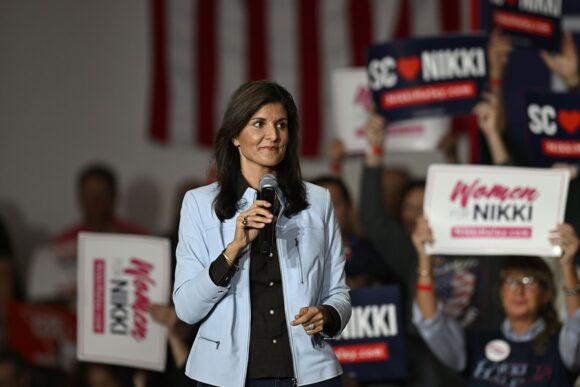
Peter Zay/Anadolu/Getty Images
Dear Commons Community,
Nikki Haley is vowing not to give up and to go the distance against Trump. Jazmine Ulloa, politics reporter for The New York Times, had an article yesterday in which she laid out the candidate’s plan.
Below is the entire article.
We wish Haley well and hope she can pull it off!
Tony
————————————————————————————————-
The New York Times
Haley Says She Is Going the Distance Against Trump. Here’s Her Plan.
By Jazmine Ulloa
Feb. 18, 2024
One week before the Republican presidential primary in South Carolina, where polls suggest she trails by an insurmountable margin, Nikki Haley was in Texas, promising to go national, as most primary candidates, even in the most dire circumstances, usually do.
Despite big losses in Iowa, New Hampshire and Nevada, and the steep odds facing her in South Carolina, her home state, Ms. Haley is showing no signs of relenting. She is still raking in donations and building out her national footprint, as she pledges to move her party past former President Donald J. Trump.
“He said he’s going to spend more time in a courtroom than he is going to be on the campaign trail,” she said of Mr. Trump on Friday in San Antonio, referring to the hours he spent in New York last week facing criminal and civil cases. “But let me tell you what we are going to be doing. We are going to be on the campaign trail.”
Ms. Haley, a former governor of South Carolina and a United Nations ambassador under Mr. Trump, is projecting confidence even as her path to victory looks stark. In many South Carolina polls, she trails Mr. Trump by roughly 30 points — and the picture beyond next week’s contest does not look much brighter.
If Ms. Haley continues with her plans to stay in the race beyond South Carolina, as she has pledged, here is a look at how she intends to take her long-shot bid national.
The Map
The Haley campaign has announced teams of elected officials, business leaders and prominent community members to help lead their efforts in Alaska, California, Georgia, Idaho, Massachusetts, Minnesota, Utah and Washington. Her “National Women for Nikki Coalition,” which counts chapters in all 50 states and Puerto Rico, has kicked into full gear, with a mission to court suburban women turned off by Mr. Trump.
On the day after the South Carolina primary, regardless of the outcome, Ms. Haley has said she will head to Michigan, which holds its own contest Feb. 27. From there, she has plans to crisscross the country ahead of Super Tuesday, the largest single day of the primary season, and the last real chance she will have to prove she can change the course of the nomination. The expected stops include Colorado, Minnesota, Utah and Virginia.
Ms. Haley is betting her candidacy on courting independents and new Republicans in Michigan and in 11 Super Tuesday states where Republican primaries are not limited to voters affiliated with her own party. But that strategy did not succeed in New Hampshire, and she has shown weaknesses with her own base: She received support from only 29 percent of college-educated Republicans nationally, according to a CNN poll, while Mr. Trump had 55 percent of the same demographic. Another Morning Consult tracking poll showed Ms. Haley trailing Mr. Trump by big margins in every Super Tuesday state.
Ms. Haley held campaign events in Dallas and San Antonio this week and has said she would travel to Super Tuesday states in the coming weeks.
Mr. Trump has undertaken his own push in Super Tuesday states, announcing nearly 80 endorsements from state party and elected officials in 14 states. And his team has left little to chance: He and his allies have engaged in a backroom campaign to twist delegate rules in his favor, and he has said Ms. Haley’s donors would be “permanently barred from the MAGA camp.”
The Message
Ms. Haley and her allies have kept up a steady drumbeat of criticism on Mr. Trump in national media appearances and in television and digital ads. Her message has largely remained consistent: that it is time for a new generational leader who can move her party beyond the “chaos” that is Mr. Trump. But her attack lines to underscore that most recently have become sharper-edged and more numerous. She has criticized him for disparaging her husband, Maj. Michael Haley; for suggesting he would encourage Russian aggression against U.S. allies in Europe; for skewing the delegate count; and for tightening his grip over party institutions, including the Republican National Committee.
She has continued to blast Mr. Trump for spending time and campaign donations on his legal troubles. She has sought to brand him and President Biden as “grumpy, old men.”
But as of last week, Ms. Haley had not spent any money on television ads beyond Iowa, New Hampshire and South Carolina. Her allied super PAC, Stand for America Inc., had invested only about $144,900 in other states, according to AdImpact, a media-tracking firm. The Trump campaign, by comparison, had spent nearly six times as much, or about $855,200, nationwide.
Pointing to Ms. Haley’s losses, Karoline Leavitt, Mr. Trump’s national press secretary, contended he would not only “crush” her in own backyard and “demolish her on Super Tuesday.” “Only a birdbrain would stay in this race,” she said in a statement, using Mr. Trump’s insulting nickname for Ms. Haley.
The Funding
Mr. Trump’s war chest dwarfs Ms. Haley’s campaign funds. He had more than $33 million cash on hand at the end of December, while Ms. Haley had $14.6 million.
But as it has been from the start of her campaign, one bright spot for Ms. Haley is her ability to raise money. She pulled in $16.5 million in January, her highest monthly total so far. She has the backing of a number of wealthy donors. Her campaign turned Mr. Trump’s ultimatum against her donors into an opportunity to sell about 20,000 T-shirts that read “Barred. Permanently.” This month, she brought in at least $2.7 million at fund-raisers in Texas and California, according to her campaign, and $1 million more in the 48 hours after Mr. Trump disparaged Ms. Haley’s husband at a rally.
The Rationale
In interviews, some of Ms. Haley’s high-dollar donors in Texas and California echoed her focus on Mr. Trump’s and President Biden’s advanced ages, and cited Mr. Trump’s legal cases as signs that anything remains possible in the race. Mr. Trump spent Thursday in a Manhattan courtroom on criminal charges stemming from a hush-money payment to a porn star in 2016. A New York judge on Friday ordered him to pay a penalty of nearly $355 million plus interest after finding him liable for conspiring to manipulate his net worth.
“A lot can happen in politics and in our legal system,” said Timothy Draper, a Silicon Valley entrepreneur and Haley donor. “And the American people usually come to their senses when they come to the polls.”
At Gilley’s Dallas South Side Music Hall, an upscale honky-tonk, Jack Matthews, its owner and a prominent developer, said he was having an easier time raising funds for Ms. Haley now than when he started in the early days of her campaign. “Some people are afraid of supporting her because of retribution with Trump,” he acknowledged. But plenty of others, he said, “are saying, ‘We need a change.’”
His venue, where Ms. Haley spoke on Thursday night before more than 1,000 people, one year to the date of starting her presidential bid, has some campaign-trail history. There, in 2020, President Biden held a rally where his onetime Democratic rivals for the nomination endorsed him over an insurgent Bernie Sanders in a show of force for the moderate wing of their party.
Now, Ms. Haley is running a Biden-like strategy but finding herself in Mr. Sanders’s position. Nevertheless, she continued to plead her case.
“Everything he touches, we lose,” Ms. Haley said, painting Mr. Trump as an agent of “chaos” for Congress, the country and Republicans’ down-ballot prospects in November.
 Source: The Chronicle of Higher Education
Source: The Chronicle of Higher Education










